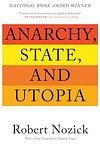Robert Nozick
Robert Nozick was an American philosopher and professor at Harvard University. He is best known for his book 'Anarchy, State, and Utopia' (1974), which presented a rigorous defense of libertarian political philosophy in response to John Rawls's 'A Theory of Justice'. Nozick's work in political philosophy, decision theory, and epistemology has been highly influential.
Books
This list of books are ONLY the books that have been ranked on the lists that are aggregated on this site. This is not a comprehensive list of all books by this author.
-
1. Anarchy, State And Utopia
The book is a seminal work in political philosophy that presents a libertarian view of a minimal state, arguing against the notion of an extensive state with distributive justice. It defends the idea that only a minimal state limited to the narrow functions of protection against force, theft, fraud, and enforcement of contracts is justified. The author challenges the concept of distributive justice and entitlement theory, positing that individuals have rights which cannot be violated by others and that the state's role should be confined to ensuring the protection of those rights. The book also explores the possibility of a utopian society, where individuals can freely form communities that reflect diverse visions of the good life, provided they respect the rights of others.
The 3266th Greatest Book of All Time -
2. Philosophical Explanations
"Philosophical Explanations" is a comprehensive work that delves into several core areas of philosophy, including metaphysics, epistemology, and ethics. The book challenges traditional philosophical methodologies and advocates for a new approach that emphasizes explanation over argument, theory, and proof. It explores profound questions about knowledge, free will, the nature of reality, and the meaning of life, offering innovative and thought-provoking perspectives. The author's style is notable for its clarity, depth, and a non-coercive mode of philosophy that invites readers to explore ideas rather than accepting them as absolute truths.
The 6974th Greatest Book of All Time

